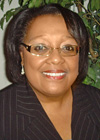
Denise M. Walston
Director, At-Large
Position: Director of Mathematics, Council of the Great City Schools, Washington, D.C.
(2011–).
Education: B.A. (mathematics and history), University of North Carolina at Greensboro; M.S.Ed. (mathematics education), Old Dominion University.
Previous Experience: Senior coordinator, K–12 mathematics, Norfolk (Virginia) Public Schools, 1994–2011.
Memberships: NCTM; National Council of Supervisors of Mathematics (NCSM); Virginia Council for Mathematics Supervision; ASCD; Beta Beta Chapter of Delta Kappa Gamma.
Activities in NCTM: Member: Program Committee, Annual Meeting, Boston (2015); chair: Southern Regional Conference Subcommittee (1987) in Richmond, Virginia.
Other Activities: NCSM: first vice president (2011–12), second vice president (2010–11); Virginia Council for Mathematics Supervision: president (2008–2010); Virginia Mathematics and Science Coalition board: member (2008–11); Beta Beta Chapter of Delta Kappa Gamma: president (2000–2006); Benjamin Banneker Association: Southern Regional representative (1994–96); Tidewater Council of Teachers of Mathematics: president (1992–96).
Publications: Coauthor: “Using Assessment to Inform Instruction on the Basis of Data,” in The Elementary Mathematics Specialist’s Handbook (NCTM 2013); author: “Mathematics Specialists in Norfolk Public Schools,” Journal of Mathematics and Science: Collaborative Explorations (2005); “Improving the Quality of Teaching Using Collaborative Professional Development: The Teacher Teaching with Technology (T3) Institute,” NCTM Dialogues (2001); Virginia Network of Technology (VANT) professional development module (1993).
Honors: Chosen to attend the 1986 Woodrow Wilson Summer Institute on Geometry (Princeton University).
Statement: I became a better teacher of mathematics because of the many resources that NCTM provides. NCTM influences policies and practices by advocating for excellence and equity for all, promotes research on problems of practice, and supports professional development programs for the ongoing development of mathematics teachers. Nevertheless, major challenges still exist, including those related to equity and access.
NCTM has a plethora of promising programs that may need to be reshaped and elevated to better advocate for equity and excellence in mathematics. Too many students are suffering in schools that are not providing sufficient support for all students. We can ill afford to wait another thirty years to actually make the vision of equity, access, and empowerment a reality.
It is an honor to be considered for the NCTM Board. I promise to use the resources from my background, experience, and commitment to work with the Board to support teachers in renewing this vision of equity and access for each and every student.